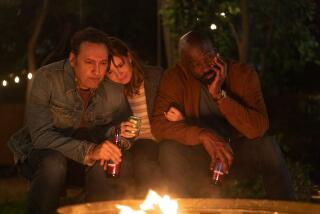Television Reviews : ‘Angel of Death’
- Share via
Despite its horrible subject matter, and as macabre as it may seem, there are actually some laughs at the end of “Angel of Death,” a compelling if somewhat unsatisfying documentary about America’s worst serial killer, Donald Harvey (Sunday at 10 p.m. on Channel 6, 10:30 p.m. on Channel 11).
In case you’ve misplaced your Top 5 U.S. serial killer score card, Harvey is the 35-year-old nurse who confessed last summer to killing 58 people in Kentucky and Cincinnati over 16 years.
Most of his victims were patients in hospitals where he was working, and Harvey claims the killings were mercy killings. Most of the victims were quietly but effectively killed in their hospital beds by lethal injections of cyanide, but he also smothered a comatose patient with a plastic bag. During his off-hours he put hepatitis germs in the coffee of a woman friend who was bugging him, delivered a poisoned pie to his upstairs neighbor and slipped arsenic to his homosexual lover’s bothersome mother. Harvey, who is now serving three consecutive life sentences in Ohio, was only caught by accident.
Despite some dramatic excesses, unclear spots and unanswered questions, reporter Bob MacKenzie of KTVU in Oakland competently reports the basic facts of this genuine American horror story. He interviews Harvey’s family members and school teachers, who agree that Harvey was a regular Boy Scout--polite, considerate, well dressed. A model son.
But few viewers will swallow that character assessment after watching MacKenzie’s 15-minute jail-house interview with Harvey, a creepy goody-goody who shows himself to be as morally confused and dimwitted as he was dangerous.
MacKenzie’s questioning is sharp and pretty tough. Did the sexual abuse Harvey suffered from age 5 to 18 cause him to kill? No. Did his interest in the occult? No. Is he mentally disturbed? No .
Harvey offers only qualified regrets, shows no remorse and can’t or won’t explain why he killed. Toward the end, the interview turns a little sick, humor-wise, when Harvey tells MacKenzie that despite all those murders he’s really a “caring person” who is at peace with himself and is “looking forward to his new (prison) surroundings.”
Harvey does say he wants all the victims’ families to know he still cares, though. And later, when his mother says she’s a victim too because she’s lost a son and because there’ll be no more family get-togethers, you might want to scream. It’s almost as funny as Harvey’s defense lawyer, who says he trusts his client, “but wouldn’t go to his house for dinner.”
More to Read
The complete guide to home viewing
Get Screen Gab for everything about the TV shows and streaming movies everyone’s talking about.
You may occasionally receive promotional content from the Los Angeles Times.






